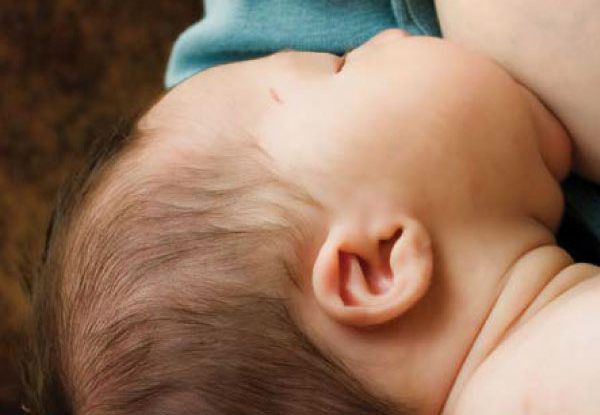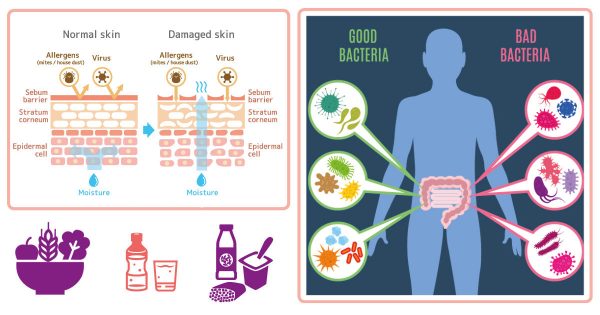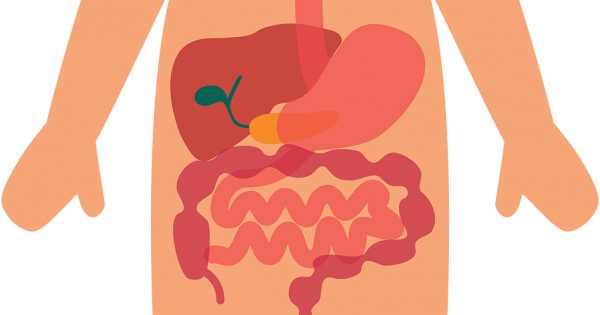Your baby’s gut microbiota begins developing after he is born, with his first exposure during vaginal birth and from breast milk.
These are the two main sources where he gets his gut microbiota mix of bacteria, e.g. Bifidobacteria and Lactobacillus, and both of these good bacteria can also be acquired from probiotic-rich foods. In the case of breastfed babies, research shows that Lactobacillus is outnumbered by Bifidobacteria by a ratio of 2 to 8.
The general consensus is that vaginal births provide the best start possible (in terms of initial gut microbiota seeding) when compared against caesarean section births and only one study refutes this.
What this means for baby
Thus, breastfeeding is crucial not just in providing overall nutrition and optimal growth for your baby, it is also essential in helping shape his gut microbiota as well. Breast milk is a rich concoction of many nutrients that baby needs, including prebiotics in the form of oligosaccharides and glycoconjugates, which pass undigested through his small intestine and acts as a prebiotic in his colon. This helps support the establishment of Bifidobacteria.
However, the establishment of Bifidobacteria can be influenced by environmental factors such as a short duration of breastfeeding, breast milk quality, the use of anti-microbial products, and antibiotic usage. There is evidence that shows how breastfed babies exhibit a more stable and uniform gut microbiota when compared to formula-fed babies, and they also tend to have less bad bacteria in their guts.
Did you know?
Prebiotics are food for the probiotics (which are the ‘good’ bacteria). Prebiotics can be in the form of macronutrients such as oligosaccharides (e.g. galacto-oligosaccharides (GOS), or dietary fibre from foods such as legumes, wholegrain foods, fruits, and vegetables.
Building up good bacteria
As your breast milk is the main source of prebiotics and probiotics for your baby, here are some Do’s & Don’ts that mothers should observe in order to help him achieve a well-balanced gut microbiota.
Do’s
- Take care to eat healthily – your doctor may advise you if there are any foods that you should avoid, especially if you have any chronic diseases such as diabetes or hypertension. Ensure that your diet is nutritionally complete – this is especially important during breastfeeding as you will need to provide sufficient nutrients to your baby via your breast milk. If there are any medical reasons why you cannot breastfeed him, do check with your paediatrician on how you can best ensure that his gut microbiota continues developing properly.
- Maintain good digestive health – be sure to eat sufficient prebiotics and probiotics-rich food to ensure that your own digestive system is in top form to defend against disease and infections. Probiotic-rich foods include fermented milk products (such as cultured milk drink, yoghurt and cheeses), fermented soy products (such as tempeh), and fermented vegetables (such as acar, kimchi and pickles). Older infants who have begun complementary feeding or toddlers should also be encouraged to eat probiotic-rich foods. Do talk to his paediatrician for details on how to maintain a healthy ratio of Lactobacillus to Bifidobacteria.
- Stay physically active – although it can be physically draining, don’t neglect your own physical health. Try aiming for an accumulated total of an hour’s worth of physical activity or exercise every day. A simple routine might be going for a brisk walk with baby around the park in the morning and evening (15 minutes each time) followed by another one session (30 minutes) of yoga, or perhaps even split it further into another two 15-minute session of some other activity such as swimming or jogging. As with any form of exercise, don’t over-exert yourself and keep to an activity level that leaves you sweating but not panting heavily or badly out of breath.
Don’ts
- Antibiotic usage – make it a habit NOT to request for antibiotics when you visit a doctor. If your doctor does prescribe it, do check whether it is absolutely necessary or not. Chances are high that you may not need it at all, especially if you have a viral infection. Antibiotics only affect bacterial infections, and taking them usually leads to an imbalanced gut microbiota as it also kills the probiotics, thus allowing other bacteria a chance to flourish. An unwanted side-effect is antibiotic-associated diarrhoea, which can be alleviated by reintroducing probiotics – do check with your doctor on this if you face this problem.
- Antibacterial product usage – these include products such as soaps, detergents, and other cleaning products labelled as ‘anti-bacterial’. In the case of antibacterial soaps, the US Food and Drug Administration (FDA) suggest using plain soap and water as there is insufficient scientific evidence to back the manufacturers’ claims. In fact, wide usage of these products is even suspected to have potentially negative health effects. Be sure to check that the product you are buying does not contain the active ingredients called triclosan and triclocarban. Stick with the usual hand-washing practices as it is effective in preventing the spread of most infections and illnesses. FDA’s recommendation only covers consumer antibacterial soaps and body washes used with water, not other products such as hand sanitisers/wipes or antibacterial soaps used in healthcare (e.g. hospitals).
Stay the course
While getting your baby’s gut microbiota off to a good start is important, don’t let it be the main focus of your experience with him. By focusing on breastfeeding instead, you will achieve this while also ensuring that he gets all the nutrients he needs to grow. Additionally, breastfeeding also helps strengthen your bond with him. Be sure to breastfeed him according to the recommendations, i.e. exclusive breastfeeding for the first six months and continue to breastfeed until two years of age.
An educational contribution by Malaysian Paediatric Association.









Comments